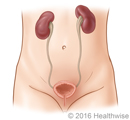Nephrotic Syndrome
Topic Overview

What is nephrotic syndrome?
Nephrotic syndrome is a sign that your kidneys aren’t working right. As a result, you have:
- High levels of protein in your urine.
- Low levels of protein in your blood.
You may also have high levels of cholesterol in your blood.
Nephrotic syndrome isn’t a disease. It’s a warning that something is damaging your kidneys. Without treatment, that problem could cause kidney failure. So it’s important to get treatment right away.
Nephrotic syndrome can occur at any age. But it is most common in children between the ages of 18 months and 8 years.
What causes nephrotic syndrome?
The kidneys have tiny blood vessels called glomeruli that filter waste and extra water from the blood. Healthy kidneys keep the right amount of protein in the blood. Protein helps move water from the tissues into the blood. When the tiny filters are damaged, too much protein slips from the blood into the urine. As a result, fluid builds up in the tissues and causes swelling.
Nephrotic syndrome is often caused by:
- A type of kidney disease called minimal change disease (or nil disease). This is the main cause of nephrotic syndrome in children. Doctors don’t know what causes minimal change disease.
- Diabetes. This is the most common cause of nephrotic syndrome in adults.
Many other things can cause the blood vessel damage that leads to nephrotic syndrome, including:
- Kidney diseases that attack the glomeruli, such as membranous glomerulopathy and focal segmental glomerulosclerosis.
- Diseases such as lupus and certain cancers.
- Infections, such as HIV, hepatitis B, and hepatitis C.
- Medicines such as nonsteroidal anti-inflammatory drugs.
Sometimes doctors don’t know what causes it.
What are the symptoms?
Symptoms may include:
- Swelling around the eyes or in the feet or ankles. This is the most common symptom.
- Fatigue.
- Weight gain (from fluid buildup).
- Foam when urinating.
- Loss of appetite.
How is nephrotic syndrome diagnosed?
Doctors diagnose nephrotic syndrome using:
- Urine tests to measure the amount of protein in your urine.
- Blood tests to measure the amount of protein, cholesterol, and sugar (glucose) in your blood.
- Ultrasound to look at the kidneys. This test can rule out other causes of your symptoms.
A kidney biopsy may be done to find the cause. You may also have other tests to identify what is causing nephrotic syndrome.
How is it treated?
Treatment aims to reverse, slow, or prevent further kidney damage. The treatment you need depends on your age and what health problem is causing nephrotic syndrome.
Some people may not need medicine if they are at low risk for problems or are getting better on their own. Others may need medicines that decrease the body’s immune system response. These include:
- Corticosteroids, such as prednisone.
- Other immune-suppressing medicines, such as cyclosporine and cyclophosphamide.
Nephrotic syndrome can lead to other problems that may need treatment, including high blood pressure, blood clots, and high cholesterol or triglycerides. You might need medicines to treat these problems, such as:
- Blood pressure medicines to lower blood pressure and help protect the kidneys.
- Water pills (diuretics). These help reduce fluid buildup in the body and lower blood pressure.
- Blood thinners to prevent blood clots.
- Statins to reduce high cholesterol.
Young children who get treatment usually get better and have no lasting problems. Often treatment is not as successful in older children and adults. If your symptoms are severe or they come back, you may need treatment for months to years, or even for the rest of your life.
If treatment doesn’t stop the kidney damage, you may develop chronic kidney disease.
What can you do at home for nephrotic syndrome?
If you have nephrotic syndrome, it’s important to:
- See your doctor regularly to have your kidney function checked. Children usually need to see a doctor more often than adults do.
- Take all your medicines as prescribed, even after you start to feel better. Talk to your doctor if you have side effects.
- Make sure your doctor knows about all the medicines, vitamins, or herbal supplements you take. This means anything you take with or without a prescription.
- Get a flu shot each year. And get any other immunizations your doctor recommends.
There are also things you can do to reduce your symptoms and prevent other health problems.
- Cut down on salt. This can reduce the amount of water your body retains.
- Choose foods low in saturated fat. This can help prevent and reduce high cholesterol.
- Weight gain may be a sign that you are retaining fluid. Call your doctor if you are gaining weight or have other problems, such as trouble breathing.
- Follow your doctor or dietitian’s advice for the amount of protein you need in your diet.
- Be gentle with your skin. Nephrotic syndrome may cause your skin to become infected (cellulitis).
References
Other Works Consulted
- Lee BK, Vincenti FG (2013). Diagnosis of medical renal disease. In JW McAninch, TF Lue, eds., Smith and Tanagho’s General Urology, 18th ed., pp. 529–539. New York: McGraw-Hill.
- Lewis JB, Neilson EG (2015). Glomerular diseases. In DL Kasper et al., eds., Harrison’s Principles of Internal Medicine, 19th ed., vol. 2, pp. 1831–1850. New York: McGraw-Hill Education.
- Palmer LS, Trachtman H (2012). Renal functional development and diseases in children. In AJ Wein et al., eds., Campbell-Walsh Urology, 10th ed., vol. 4, pp. 3002–3027. Philadelphia: Saunders.
- Praga M, et al. (2015). Primary glomerular diseases. In ET Bope, RD Kellerman, eds., Conn’s Current Therapy 2015, pp. 929–933. Philadelphia: Saunders.
- Watnik S, Dirkx T (2012). Kidney disease. In SJ McPhee, MA Papadakis, eds., 2012 Current Medical Diagnosis and Treatment, 51st ed., pp. 874–911. New York: McGraw-Hill.
Current as of: October 31, 2018
Author: Healthwise Staff
Medical Review:E. Gregory Thompson, MD – Internal Medicine & Adam Husney, MD – Family Medicine & Kathleen Romito, MD – Family Medicine & Tushar J Vachharajani, MD, FASN, FACP – Nephrology
This information does not replace the advice of a doctor. Healthwise, Incorporated, disclaims any warranty or liability for your use of this information. Your use of this information means that you agree to the Terms of Use. Learn how we develop our content.



